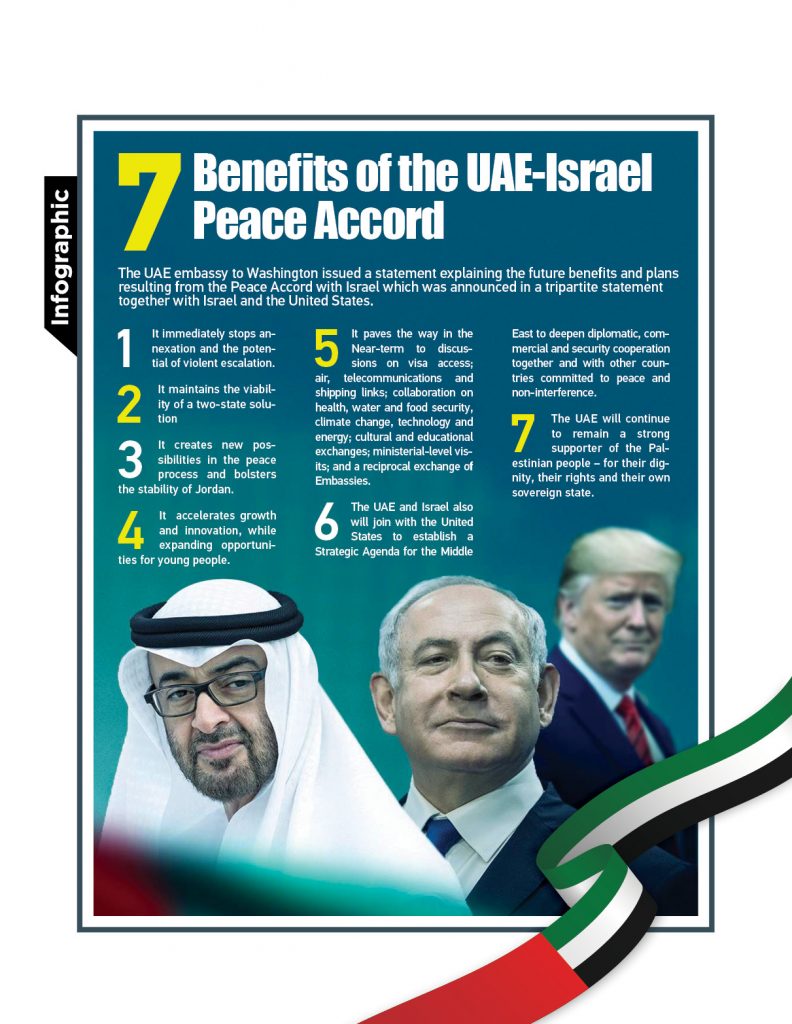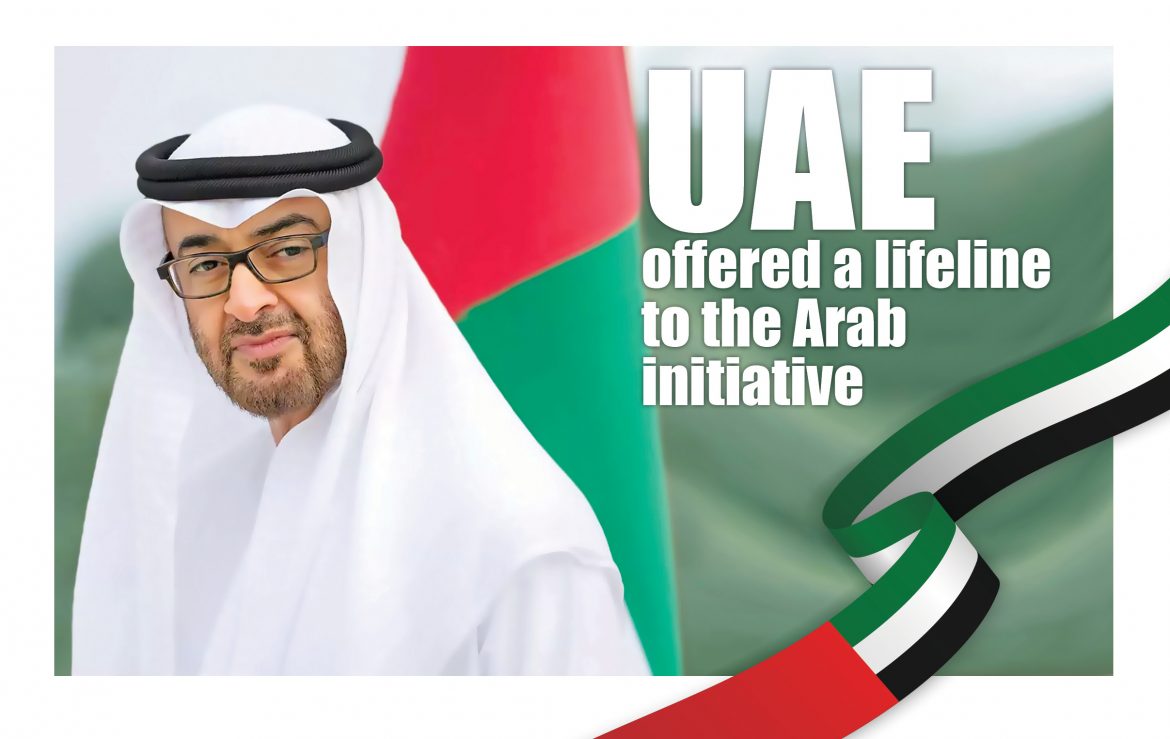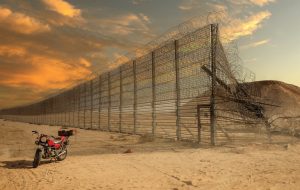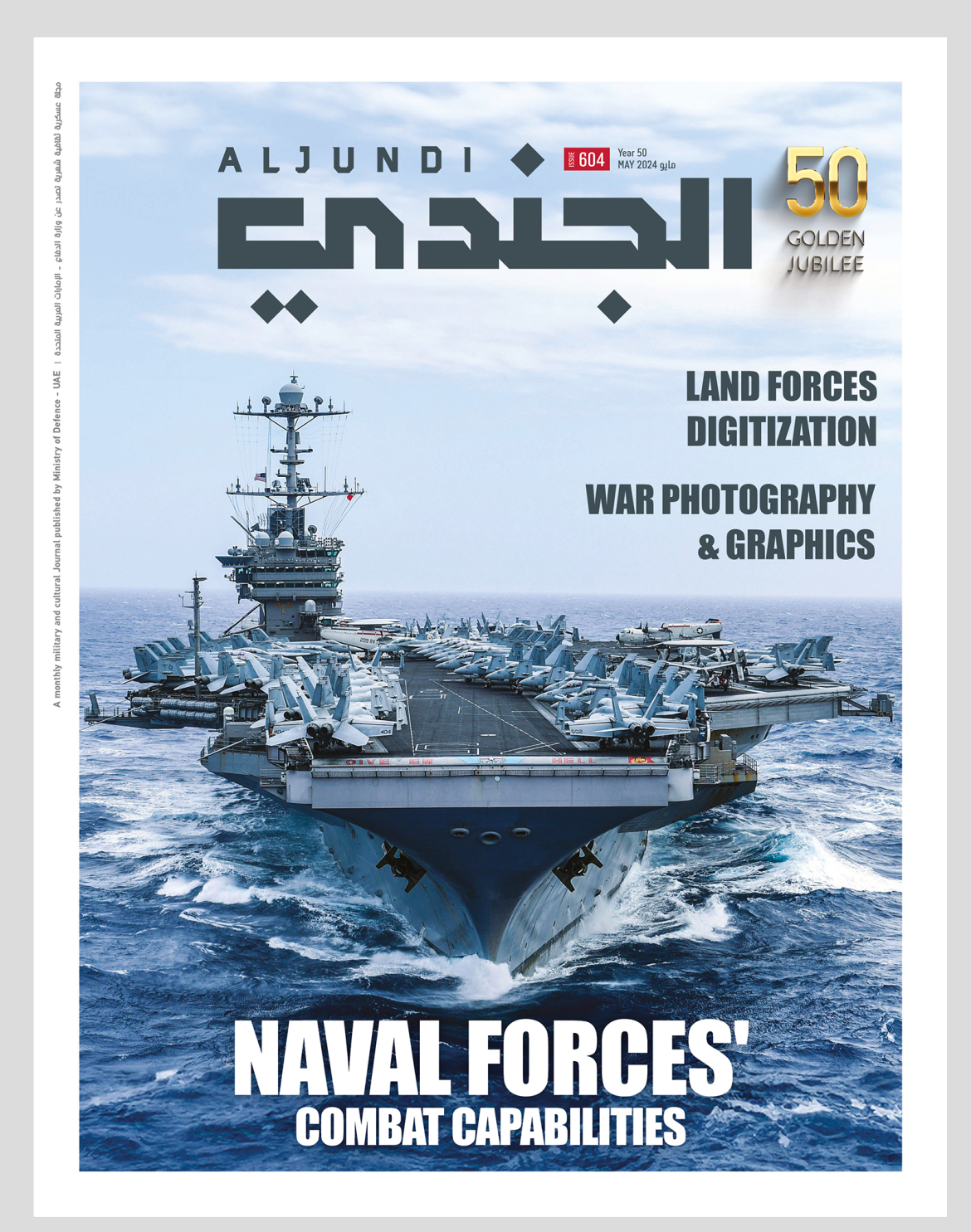The UAE surprised the world with a tripartite deal showing unrelenting determination and steadfast resolve as it builds on the positive experiences of Egypt and Jordan while eschewing negative positions by parties blinded by narrow calculations and void reactions.
The UAE’s carefully planned “confrontation” can also be described as a “peace offensive” that is bold, strong, clear and beneficial both in terms of its timeliness and its form. The deal came at a time other alternatives showed their impotence in ending a stalemate that has affected the ordinary Palestinian citizen more than anyone else, as the spectre of the annexation of a third of the West bank looms threatening to put a lasting end to prospects for the two-state solution in view of the lack of a territory that can be negotiated to set up a Palestinian state. So, how did this initiative came to the fore and how was it materialized? What is its significance and the horizons to maximise its results? And what are the means to perpetuate it to gain more assets? Will it meet the same goals of the Arab Initiative which was rejected by Israel and the United States?
How the tripartite agreement was reached?
A vital factor to be taken into consideration is the particular attention paid by UAE leadership to the Emirati public opinion and the defence of the supreme interests of the country, while always showing support for the Palestinian cause offering levers to lift the conflict out of its current deadlock and empty slogans. Unlike Turkey, where most of public opinion makers are behind bars or pushed to exile, or Qatar which lacks a public opinion in the first place, the UAE’s people have always been appreciated and taken into account. Hence, the duration taken to reach a deal. The Emiratis showed patience before interacting with Israelis following the Oslo agreement, contrary to other Arab parties in the Gulf and elsewhere. This was followed by indicators such as the participation of Israeli athletes in sports competition in the UAE and the launch of the inter-religious dialogue.
The tripartite agreement paved the way for upholding commitments made to international sports organisations to spare the UAE sanctions if it bans athletes from taking part on competitions on its soil. The deal also opened the UAE doors to “inter-religious dialogue”, highlighting the tolerance and the values of Abrahamic religions and their rejection of aggression, occupation and racism. In this respect, Mark Scheiner, an American rabbi and former deputy head of the Jewish Congress with strong influence in the United States and Israel, recently highlighted to Israeli Makor Rishon newspapers the factors and interests that convinced Israel to accept Emirati condition to freeze its annexation and to clearly mention holy sites in the deal. He said he attended the negotiations between the two parties in recent months, adding that the agreement was a result of a combination of the following factors:
1
Fighting against the
coronavirus.
2
cooperating to find a vaccine or an anti-body.
3
Countering the mounting Iranian threat.
4
Stopping Israeli plan to annex the third of the West Bank.
These four issues are urgent and cannot be delayed, especially that the annexation was promised by President Netanyahu to his proponents prior to elections. He even reached an agreement to that end with one of his ardent opponents General Benny Gants which enabled the formation of a coalition government between the Likud and the Blue and White parties.
After all this momentum came a bold and resounding tripartite agreement kept away from the eyes of the media until its ideas were clearly elaborated. We moved to speaking to the Israeli public opinion with a language that it can understand through mainstream media and this was a smart move that safeguarded the agreement and put it above Israeli political parties and their political escalations. It could have been easier to abort the Emirati initiative if extremist parties impeded official contacts by mobilising settlers and proponents of the far-right and violent parties, including those banned by Israeli law- such as the outlawed Kach and Kahana – who have been able to blackmail consecutive governments.
The UAE has anticipated the date of July 1 which was set to annex the third of the West Bank and refused to adopt a reaction policy and sent via its ambassador in Washington Youssef Al Otaiba a strong message saying: “choose between annexation and normalising relations with us.” It was clear for vigilant analysts that this did not only refer to the UAE but it was rather a coordination with influential Arab parties.
A response to extremist opponents of the deal
The UAE offered a praise-worthy position and launched a planned “peace offensive” leading to the current situation governed by factors that cannot be overlooked:
1
Faltering resistance that is more preoccupied by interferences in Arab domestic issues.
2
Deepening inter-Palestinian divides.
3
Abandonment by armies and countries of the Arab-Israeli conflict.
4
Weakening influence of popular support for the Israeli left.
5
Demographic growth within the Green Line stands at 1.9% compared to 3.5% within settlements, according to Peace Now anti-settlement movement. This requires a swift response instead of being contented with denunciation while situation rapidly changes on the ground;
However, the policy of “business as usual” is still ongoing ignoring that politics is the art of the possible. Therefore, if the situation changes and the Palestinian resistance or negotiator could achieve better result, nothing can prevent them or impose special measures. No one can confiscate the right of other parties within the Palestinian community or the Arab scene to strive and seek in their own way the means to attain progress or stop the continuous bleeding which prominent poet Mahmoud Darwish called “Diary of Normal Sadness.”
Just like Egypt retrieved Taba through compelling arbitration instead of non-binding agreement, the Emirati initiative or the “peace offensive” will benefit a lot from intra-Israeli disagreements between seculars and religious parties, the left and the right, eastern and western Jews and the continuation of racism against Jews of Russian and Ethiopian origins.
In this respect, we should also pay particular attention to the cost for achieving this plan. If annexation could be frozen through political negotiations and diplomatic contacts, wouldn’t this be a process that deserves our support? Is there another process that can lead to the same goal or fail after thousands of Palestinians lose their lives and have their basic services destroyed? For sure, the peaceful process that would spare ordinary citizens the toll of wars and aggression in asymmetric confrontations is the right path especially that repercussions are always heavier when a party uses civilians as a shield.
In other words, is it rewarding to let leaders of Palestinian factions use human shields, while Israel kills thousands and destroys homes and institutions offering vital services amid condemnations and slogans such as “death to America and Israel” in return for a freeze of annexation? Isn’t it better to achieve the same goal through a series of negotiations and pressures using interests instead of emotions? Finally, Israel is not a charity organization and has never respected UN resolutions unless it found itself besieged and compelled to make concessions. Giving a chance to the peace process in all considerations will be beneficial and deserves all effort.
In this context, we can say that the agreement dealt a severe blow to the plan to extend Israeli settlements. This will make the adoption of budgets to build new settlements or increase units within them a very difficult issue since dismantling settlements especially smaller and medium-sized ones will be raised in any contact or consultations with Gulf or other Arab states. The UAE stresses on the following equation: “Give some rights to Palestinians in return for normalizing ties and contacts.” This is the same principle permeating the Arab Initiative which Israel has long rejected. Therefore, allocating budgets and building settlements will be a mere squandering of money and effort.
We do not ignore that the door is now open to maximise returns of the tripartite agreement as long as Emirates succeeded in reaching a political solution and to freeze an annexation promised in July and now long overdue. US guarantees were offered for a halt of annexation and an end to Israel plan to lay its grip on a third of the West Bank. The agreement stipulates that the Holy sites in Jerusalem should be open to all Muslims (this is extremely sensitive for the Israeli right). All of this happened thanks to a phone call. Forging ahead with this peace process can lead to milestones because Abu Dhabi linked progress in relations with Israel to a breakthrough in the Palestinian process without seeking any security or economic advantages. This principle can be applied when other Arab countries join this deal sooner or later.
It is likely that swathes of Palestinian detainees could benefit from the deal. Negotiations to release prisoners of the calibre of Fatah leader Marwan Barghouti, who could have a role within the reformist trend in his organization to reach an agreement leading to unconventional means to achieve rights.
Other direct benefits of the deal which will make it equivalent to the Arab Initiative as soon as other countries join is that it put pressure on Israel. Currently, there is a debate on “who controls decision-making in Israel? Is it the majority, the government or settlers? (Settlers are estimated at 400,000 people representing 4% of Israelis). This debate will become intense in the future as the date of the settlements freeze approaches along with the dismantling of small and medium-sized settlements in return for a land swap to keep the settlements such as Ma’ale Adumim (38,000 settler) and Ariel (20,000 settler).
This issue is a war crime according to international law because it consisted of transferring people into an occupied land. Israelis used to put symbols on products of settlements sold in European sold so that they could be boycotted by those who wish so. Settlements are now practically on the edge with the annexation freeze and as Israel is being compelled to backtrack on its promises and decisions made under the right-wing government with previously extremist stands.
Results:
1 The greatest achievement is to put the Palestinian cause once again on top of priorities and to negotiate Palestinian rights after internal divisions and regional crises pushed them into oblivion. The sought goal is for Palestinians to grab this chance.
2 Negotiations with Israelis will not be easy. It will be an arduous process requiring extreme vigilance in order to meet the rights of Palestinians and Arabs.
3 The step by step policy followed smoothly by the UAE will add a great deal of flexibility and space for maneuvers if Israel fails to uphold its commitments and promises. It is unlikely though that Israel will fail to fulfill its commitments in the presence of US guarantees and as it seeks the success of this initiative so that other influential Arab countries could join.
4 It is extremely important to change stereotypes about Arabs within the Israeli public opinion which leans on the stands of far-right and extremist groups which say that there is no Palestinian or Arab partner that can engage in negotiations for peace. Therefore, there is no other option but to be extremist. In the same vein of changing negative stereotypes about Arabs. The UAE offers a vibrant example in terms of urban development, international trade, air transport and world-class exhibitions strengthening the country’s competitiveness in a set of fields.
5 The deal will offer the Arab moderate camp a great deal of manoeuvrability in the face of Iranian and Turkish outspoken expansionism. It will have a positive economic impact on all parties following the coronavirus crises which put a strain on state budgets and caused closures of markets and big companies. It also comes after Jared Kushner (Trump’s senior adviser) and a number of United States officials rejected the Arab initiative in 2019. Saudi Arabia, however, remained attached to this initiative in coordination with Abu Dhabi and other brotherly countries in the region to break the stalemate which has continued for years and put the Arab initiative on track after many thought it has been outdated.

By: Dr Ahmed Fouad Anwar
Political Affairs Researcher













